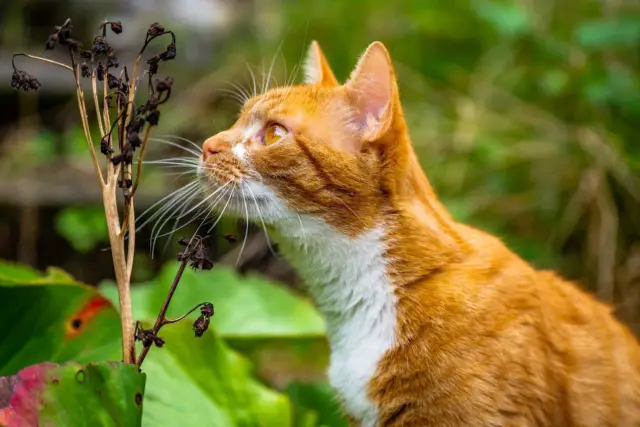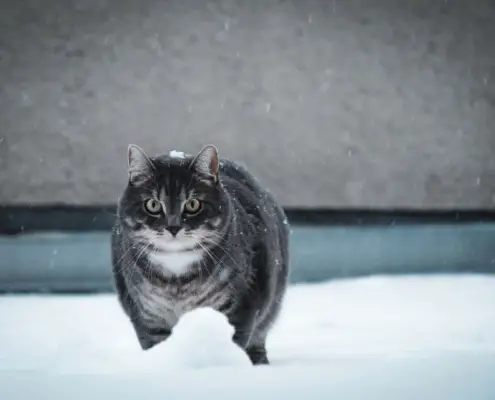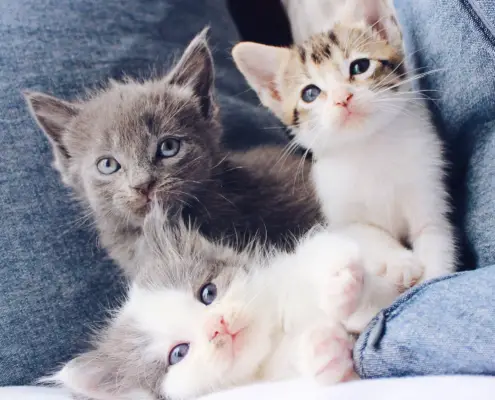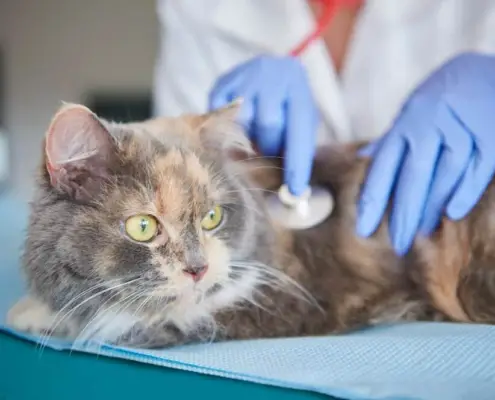
Cats are fascinating creatures with a range of intriguing behaviors, and one of the most perplexing is their habit of eating grass. Many cat owners have witnessed their feline friends nibbling on blades of grass, only to regurgitate it later. But why do cats eat grass? In this article, we will delve into the reasons behind this behavior, exploring both the biological and instinctual aspects of cats’ grass consumption.
The Biological Reasons Behind Cats’ Grass Consumption
One of the primary reasons cats eat grass is to aid their digestion. Cats are obligate carnivores, which means their bodies are designed to thrive on a diet primarily consisting of meat. However, their digestive systems are not equipped to break down plant matter efficiently. By ingesting grass, cats are able to induce vomiting, which helps them eliminate any indigestible material from their stomachs, such as furballs or other debris. This natural mechanism allows cats to maintain their digestive health and prevent any potential blockages.
Additionally, grass contains essential nutrients such as folic acid, fiber, and vitamins A and C. These nutrients can be beneficial to cats, especially if their regular diet lacks certain elements. Cats in the wild often consume the entire prey, including the stomach contents, which may contain partially digested plant matter. By eating grass, domestic cats may be instinctively seeking these vital nutrients that are not readily available in their typical diet.
The Nutritional Benefits of Grass for Cats
Apart from aiding digestion, grass can provide several other nutritional benefits to cats. For instance, the fiber content in grass can help regulate their bowel movements and prevent constipation. This is particularly important for cats that primarily eat dry kibble, which may not provide adequate hydration or fiber. Grass can act as a natural laxative, promoting regularity and preventing gastrointestinal issues.
Grass also contains chlorophyll, a natural pigment that is responsible for the green color of plants. Chlorophyll has antioxidant properties and can help detoxify the body by eliminating harmful toxins. Furthermore, the act of chewing grass can stimulate saliva production, promoting oral health and reducing the risk of dental problems in cats. Overall, the nutritional benefits of grass make it a valuable addition to a cat’s diet, as long as it is consumed in moderation and from safe sources.
Cats’ Instinctual Behavior and Grass-Eating
In addition to the biological reasons, cats’ grass-eating habit can be attributed to their instinctual behavior. Cats are natural hunters, and even domesticated cats retain many of their ancestral instincts. In the wild, cats consume the entire prey, including the stomach contents, which often consist of plant matter. This behavior is thought to have evolved as a way for cats to obtain additional nutrients and aid in digestion.
Furthermore, grass-eating can be a form of self-medication for cats. When cats have an upset stomach or feel nauseous, they may instinctively seek out grass to induce vomiting and alleviate their discomfort. This behavior allows cats to self-regulate their digestive system and maintain their overall well-being. While it may seem strange to us, it is a perfectly natural behavior for our feline companions.
Common Myths and Misconceptions about Cats Eating Grass
There are several myths and misconceptions surrounding cats’ grass-eating habit that need to be addressed. One common misconception is that cats eat grass to make themselves sick. While it is true that grass can induce vomiting, cats do not intentionally consume it to get rid of something harmful. As mentioned earlier, cats eat grass to aid their digestion and eliminate any indigestible material from their stomachs. It is a natural and necessary process for them.
Another myth is that all types of grass are safe for cats to eat. While most grasses are harmless, certain types can be toxic and pose a danger to cats. For example, some ornamental grasses or grasses treated with pesticides or fertilizers can be harmful if ingested. It is essential for cat owners to create a safe environment for their feline friends to indulge in grass by providing access to cat-friendly grasses or growing their own cat grass indoors.
The Potential Risks and Dangers of Cats Eating Certain Types of Grass
Although grass can be beneficial for cats, it is crucial to be aware of the potential risks and dangers associated with certain types of grass. As mentioned earlier, some grasses may be treated with chemicals or pesticides that can be toxic to cats. It is essential to avoid allowing cats to graze on grass in areas where these substances may have been applied. Additionally, some plants that resemble grass, such as lilies or certain types of ferns, can be highly toxic to cats and should be kept out of their reach.
Moreover, grass that has been sprayed with herbicides or exposed to other environmental toxins can also pose a risk to cats. These chemicals can be harmful if ingested and may lead to various health issues. To ensure the safety of your cat, it is crucial to carefully choose the type of grass they have access to and ensure it is from a trusted source that does not use any harmful substances.
How to Provide a Safe and Controlled Environment for Cats to Indulge in Grass
To provide a safe and controlled environment for cats to indulge in their grass-eating habit, there are a few steps you can take as a responsible cat owner. Firstly, consider growing cat grass indoors. Cat grass, such as wheatgrass or oat grass, can be easily grown in pots or trays and provides a safe alternative to outdoor grass. This allows you to control the environment and ensure the grass is free from any harmful substances.
Additionally, if you have a yard, create a designated area where you grow cat-friendly grass. Make sure to choose grass varieties that are safe for cats and avoid using any chemicals or pesticides on the grass. Regularly monitor the area for any potentially toxic plants and remove them promptly. By providing a safe and controlled environment for your cat to indulge in grass, you can enhance their overall well-being and minimize any potential risks.
Alternatives to Grass for Cats’ Dietary Needs
While grass can be beneficial for cats, it is not the only option to fulfill their dietary needs. Commercially available cat food is specifically formulated to provide cats with all the essential nutrients they require. High-quality cat food should contain a balance of animal proteins, fats, vitamins, and minerals to support their overall health. Consult with your veterinarian to determine the best diet for your cat, taking into consideration any specific dietary requirements or health concerns.
In addition to cat food, you can also consider providing your cat with safe and appropriate plant-based treats. Many pet stores offer a variety of treats that are specifically formulated for cats and contain beneficial plant ingredients. These treats can be a great way to supplement your cat’s diet and provide additional nutrients in a controlled manner.
When to Be Concerned About Excessive Grass-Eating in Cats
While grass-eating is a natural behavior for cats, excessive consumption may indicate an underlying issue that requires attention. If you notice that your cat is constantly eating large quantities of grass or shows signs of distress after consuming grass, it is advisable to consult with your veterinarian. Excessive grass-eating can sometimes be a sign of an underlying gastrointestinal problem or nutritional deficiency that needs to be addressed.
Additionally, if your cat is vomiting frequently or experiencing other digestive issues, it is essential to seek veterinary advice. These symptoms may be unrelated to grass consumption and could indicate a more serious health condition. By monitoring your cat’s behavior and seeking professional guidance when necessary, you can ensure their well-being and address any potential concerns.
Understanding and Embracing Cats’ Grass-Eating Habit
In conclusion, cats’ grass-eating habit is a fascinating behavior that serves both biological and instinctual purposes. From aiding digestion to providing essential nutrients, grass can offer several benefits to cats. However, it is essential for cat owners to be aware of the potential risks and dangers associated with certain types of grass and create a safe environment for their feline companions.
By understanding the reasons behind cats’ grass consumption and providing suitable alternatives, such as cat grass or plant-based treats, you can ensure that your cat’s dietary needs are met while minimizing any potential risks. Remember to monitor your cat’s behavior and consult with a veterinarian if you have any concerns about their grass-eating habits. Embracing this natural behavior and providing a safe environment will contribute to your cat’s overall health and well-being.
If you enjoyed my article, I would appreciate you sharing it with your network.

Sima Ndlebe
Sima writes for CatBuzz. He is interested in Cats, Health and Fitness, and Entrepreneurship.
Published: 18 December 2023
Related Articles
Disclaimer
The content found on CatBuzz.org is presented on an "as is" basis and is intended for general consumer information and education purposes only. Any utilization of this information is voluntary and solely at the user's own risk.
None of the articles or content should be regarded as, or used in place of, veterinary medical advice, diagnosis, or treatment. The information provided on the website is purely for educational and informational intentions and should not be considered a substitute for professional guidance from a veterinarian or other qualified expert. The articles are designed to inform consumers about veterinary healthcare and medical matters that may impact their cat's daily life. It should be noted that this website and its services do not constitute the practice of any form of veterinary medical advice, diagnosis, or treatment. CatBuzz.org explicitly disclaims any liability for any direct or indirect damages or losses that may arise from the use of or reliance on the information contained within the content.
Consumers must consult a veterinarian, veterinary specialist, or another qualified veterinary healthcare provider when seeking advice regarding their cat's health or medical conditions. It is important not to ignore, avoid, or postpone seeking medical advice from a veterinarian or other qualified veterinary healthcare provider solely based on information obtained from this website. If you believe that your cat may be experiencing a medical issue or condition, it is imperative to promptly contact a qualified veterinary healthcare professional.



